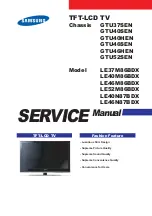
CONTENTS
SAFETY PRECAUTIONS ......................................................................................................................................................... 2
GENERAL QUIDE LINES.................................................................................................................................................... 2
TOUCH – CURRENT CHECK............................................................................................................................................. 2
PREVENTION OF ELECTROSTATIC DISCHARGE (ESD) TO ELECTROSTATICALLY SENSITIVE (ES) DEVICES ........... 3
ABOUT LEAD FREE SOLDER (PBF)....................................................................................................................................... 4
SUGGESTED PB FREE SOLDER...................................................................................................................................... 4
SERVICE HINTS ...................................................................................................................................................................... 5
SETTING INSPECTION............................................................................................................................................................ 6
SELF-CHECK ........................................................................................................................................................................... 6
ALIGNMENT SETTINGS .......................................................................................................................................................... 7
BLOCK DIAGRAMS.................................................................................................................................................................. 8
PARTS LOCATION................................................................................................................................................................. 11
REPLACEMENT PARTS LIST................................................................................................................................................ 12
SCHEMATIC DIAGRAMS....................................................................................................................................................... 19
CONDUCTOR VIEWS ............................................................................................................................................................ 25
SAFETY PRECAUTION
GENERAL GUIDE LINES
1. When servicing, observe the original lead dress. If a short circuit is found, replace all parts which have been overheated
or damaged by the short circuit.
2. After servicing, see to it that all the protective devices such as insulation barriers, insulation papers shields are properly
installed.
3. After servicing, make the following leakage current checks to prevent the customer from being exposed to shock
hazards.
4. Always ensure panel TKKL5290 is correctly replaced before returning to customer (see Fig.1).
TOUCH-CURRENT CHECK
1. Plug the AC cord directly into the AC outlet. Do not use an isolation transformer for this check.
2. Connect a measuring network for touch currents between each exposed metallic part on the set and a good earth
ground such as a water pipe, as shown in Fig. 2.
3. Use Leakage Current Tester (Simpson 228 or equivalent) to measure the potential across the measuring network.
4. Check each exposed metallic part, and measure the voltage at each point.
5. Reserve the AC plug in the AC outlet and repeat each of the above measure.
6. The potential at any point (TOUCH CURRENT) expressed as voltage U1 and U2, does not exceed the following values:
For a. c.: U1 = 35 V (peak) and U2 = 0.35 V (peak);
For d. c.: U1 = 1.0 V,
NOTE:
The limit value of U2 = 0.35 V (peak) for a. c. and U1 = 1.0 V for d. c. correspond to the values 0.7 mA (peak) a. c. and
2.0 mA d. c.
The limit value U1 = 35 V (peak) for a. c. correspond to the value 70 mA (peak) a. c. for frequencies greater than 100
kHz.
7. In case a measurement is out of the limits specified, there is a possibility of a shock hazard, and the equipment should
be repaired and rechecked before it is returned to the customer.
2
Fig. 1



































